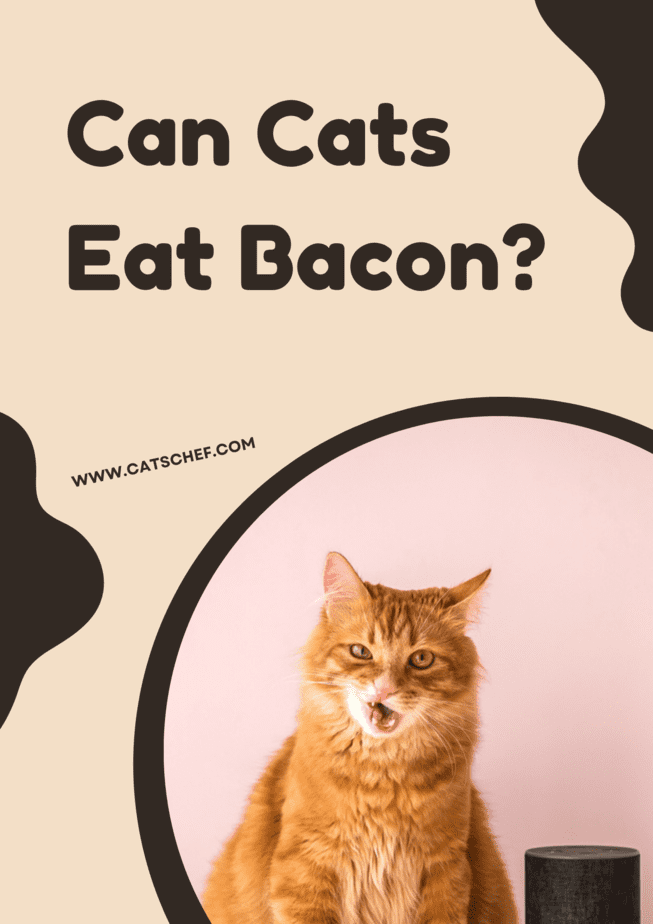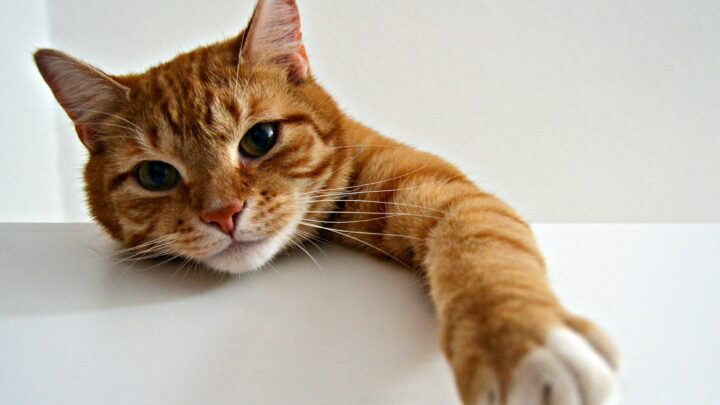Can cats eat bacon? I’m sure your cat would love to get a taste of it but should you give in and let her take a bite?
Imagine for a second your kitto could read and write! “Dear diary, I have a bone to pick with my humom. She dines lavishly on fresh meat, aromatic sauces, and mouth-watering pastries every single night. She must think I’m not aware of this travesty because she continues to feed me with dry, hard nuggets of some sort. Life isn’t fair…”
If your mischievous monster is anything like mine, chances are she loves munching on anything she can get her paws on. She’s an incredibly curious creature, and she can’t help but demand to be fed every time she catches a glimpse of you in the kitchen. “Mmm, is that bacon I smell?”
I think we can all agree that bacon is one of the greatest foods of all time. It’s incredibly flavorsome and aromatic, and its delectable crispiness is bound to put a smile on your face every time you have your breakfast. No wonder your purrer thinks it’s absolutely paw-licking delicious!
But, can cats eat bacon without any repercussions? Could this mouth-watering treat be a good choice for your feline friend? According to the ASPCA (American Society for the Prevention of Cruelty to Animals), bacon isn’t toxic to cats, but…
You shouldn’t include bacon in your cat’s diet. Bacon typically contains unfavorable ingredients that might cause serious digestive issues and other health problems to your cat. You should take a couple of things into consideration before sharing this tasty treat with your furry friend.
What is bacon?
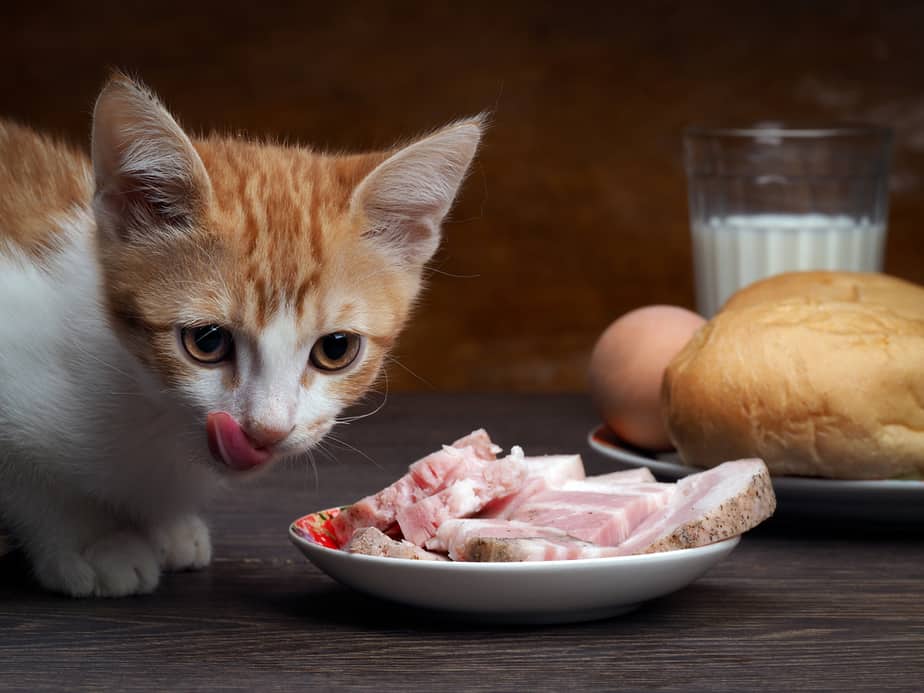
When you’re rushing to google “Can cats eat bacon?” you might want to pay closer attention to all the information about the bacon itself. The process of making this tasty treat, as well as the ingredients that go into it, is what makes bacon so unfavorable to your cat.
So, bacon is meat cut from a pig’s belly or back. This type of processed meat is typically cured in a solution of salt, nitrates, and sugar. It’s also smoked before it arrives at your local store ready to be cooked up to crispy perfection.
It’s safe to say that these ingredients ensure the best bacon-and-eggs experience you can imagine. But before you rush to prepare a plate to share with your favorite feline friend, you might want to check whether that’s such a good idea…
Can cats eat bacon?
You might have already guessed it, but all the ingredients that go into making bacon are what make bacon incredibly unhealthy for your four-legged friend. The high-salt content might lead to sodium poisoning, and high-fat content can cause clogged blood vessels and other health problems.
While bacon isn’t toxic to cats, it certainly shouldn’t be a regular part of a cat’s diet. A small piece of bacon shouldn’t cause any adverse reactions, but it’s better to stay on the safe side when it comes to your feline friend.
And if you’re still planning on sharing some bacon bits with your cat, make sure to consult with your vet beforehand. They’ll be able to give you a nudge in the right direction and provide your cat with the best care possible.
Here’s why you shouldn’t feed bacon to your cat
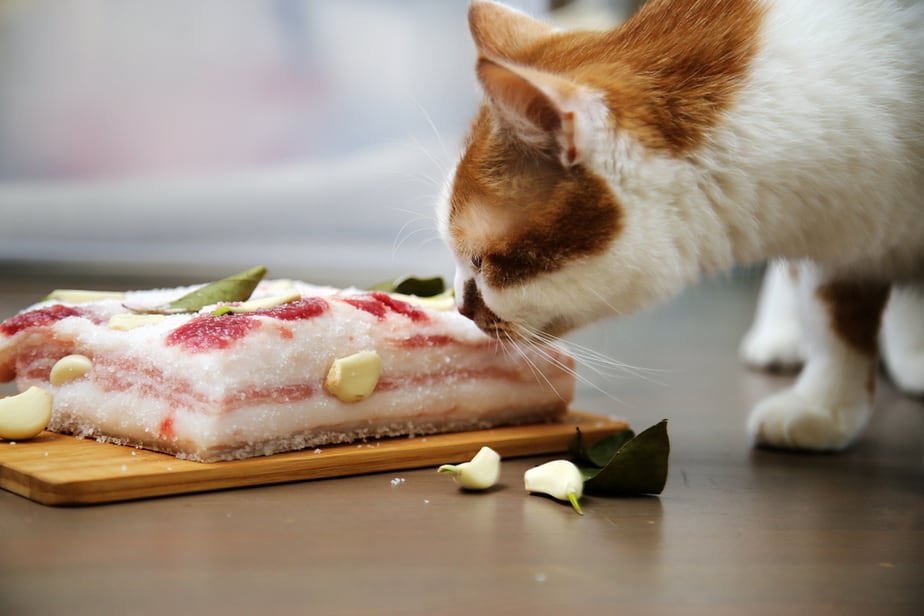
So, what exactly makes bacon so unhealthy for your feline friend? Cats are obligate carnivores, which means they require predominantly animal-derived nutrients in order to survive.
You might think to yourself “Well, bacon is meat!” – and you wouldn’t be wrong. But, processed meat doesn’t come with the nutritional and health benefits your cat needs. For example, high-quality pork is packed with protein, minerals, antioxidants, and amino acids.
This type of meat wouldn’t be a bad choice for your cat. But, once you add copious amounts of sugar, salt, nitrates, and other additives and preservatives, everything else goes down the drain. And here’s why.
1. High salt content
According to the ASPCA, salt isn’t toxic to cats. That doesn’t, however, mean that you should let your furry friend go ham on foods that are high in salt. There are too many things that could go wrong if she consumes excessive amounts of salt on a regular basis.
Why? Let’s put it like this. Your cat is supposed to consume less than 40 milligrams of salt a day. One strip of bacon (which is approximately how much she would manage to snatch from your plate before you notice) contains around 193 milligrams of salt. That’s nearly 5 times more than your kitto can handle!
And salt is incredibly tough on your cat’s digestive system! Too much bacon can leave her with various digestive issues, blood pressure issues, heart disease, liver disease, and kidney disease. And, that’s not even the worst part!
Too much salt might lead to salt poisoning. Your cat might experience symptoms such as excessive thirst and urination, vomiting, diarrhea, weakness, loss of appetite, lethargy, and incoordination. If you notice any of these symptoms, you should contact your vet immediately.
2. High fat content
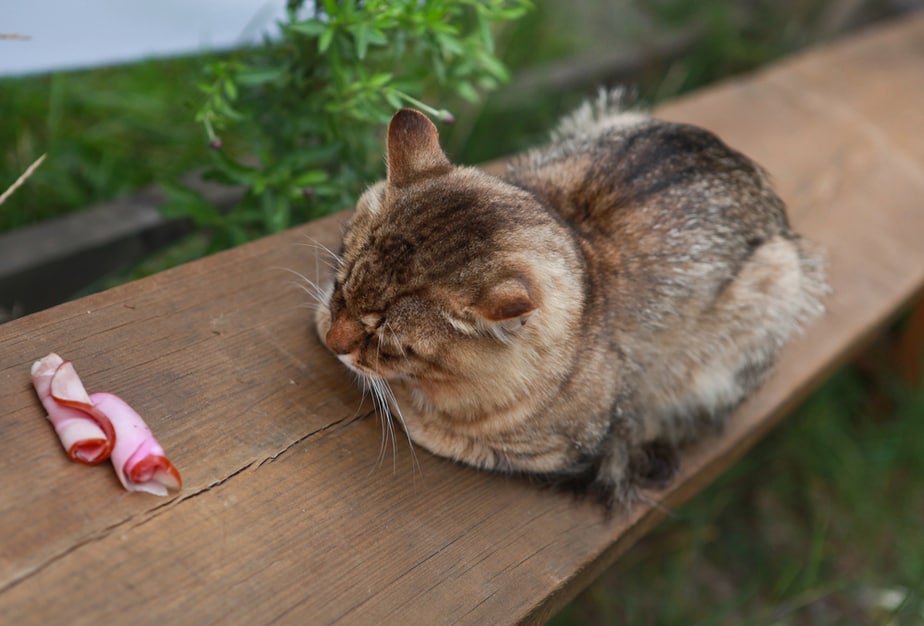
Bacon contains A LOT of fat. While there are some types of fat that are beneficial to your furry friend, bacon fat doesn’t fall under that category. Were’s looking at around 50% of monosaturated fats, 40% of saturated fats, and 10% of cholesterol.
Bacon fat might leave your cat with some serious digestive issues. Your cat’s digestive system wasn’t designed to break down processed meats, so a couple of bacon trimmings might wreak havoc in your cat’s digestive tract.
She might experience excessive thirst or urination, weakness or discomfort, lethargy, diarrhea, and vomiting. If feasting on delicious bacon bits was a one-time thing, she shouldn’t experience any long-term effects on her health. But, if it wasn’t…
Consuming excessive amounts of saturated fat over a longer period of time will leave your feline friend with some serious health problems such as high blood pressure, clogged blood vessels, feline obesity, and pancreatitis.
Pancreatitis is an inflammatory disease. It occurs when your cat’s pancreas becomes so inflamed that it allows the digestive enzymes to spill into the abdominal cavity. It’s incredibly difficult to diagnose because of its non-specific symptoms such as lethargy, reduced appetite, vomiting, and diarrhea.
So, if you notice any of these symptoms, you should schedule an appointment with your vet ASAP. And in the meantime, steer clear from sharing any bacon with your furchild.
3. Preservatives
If you’re still thinking cats can eat bacon, the number of additives and preservatives that are found in these tasty treats should be enough to convince you otherwise. Believe it or not, preservatives can be incredibly damaging to your cat’s health.
Most processed pork products contain preservatives like sodium nitrate to preserve freshness, maintain flavor, and prolong shelf life. Apart from bacon, sodium nitrate can also be found in jerky and some types of deli meat.
Most importantly, sodium nitrate can be incredibly damaging to your cat’s health. Upon entering your cat’s body, this preservative increases the risk of heart disease by damaging your cat’s blood vessels and making her arteries more likely to harden and narrow.
Additionally, large amounts of sodium nitrate can lead to nitrate poisoning. You might need to keep an eye on symptoms such as dyspnea, weakness, ataxia, muscular tremors, and frequent urination. If you notice any of these symptoms, it’s time to contact your vet.
Other than that, it’s safe to say that you should avoid feeding your cat any processed meats. While a bite-sized bacon treat shouldn’t cause any serious effects on your cat’s health, it’s better to err on the side of caution.
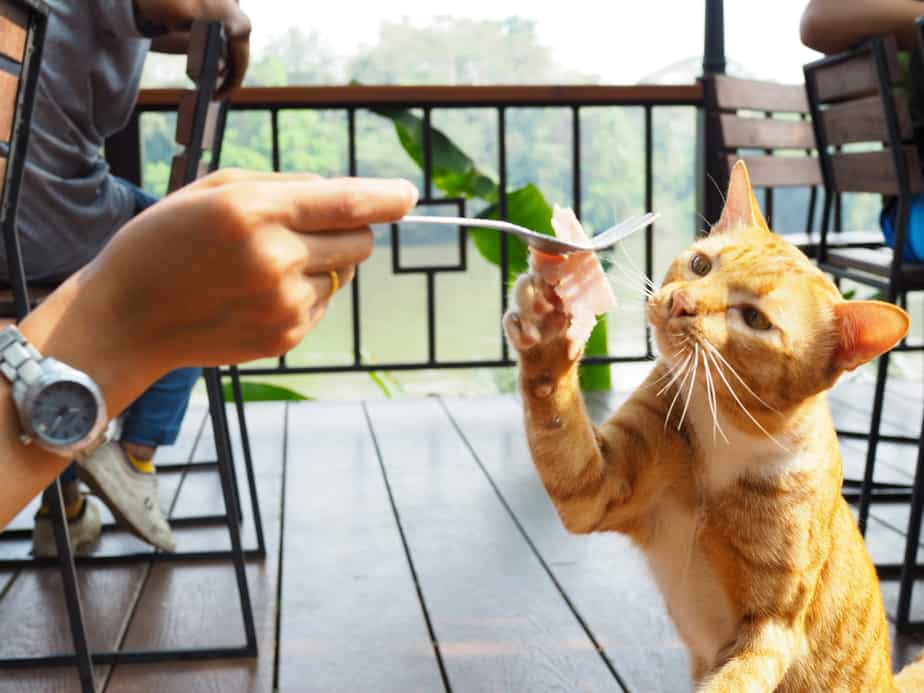
What will happen if my cat eats bacon?
Bacon as a once-off treat shouldn’t be an issue. Around 90% of your cat’s diet should be comprised of meat, animal protein, and animal-sourced nutrients. The other 10% should be reserved for treats, which is where your occasional bacon bits step in.
But, if your cat eats bacon over a longer period of time, she is bound to experience some negative side effects. What should you look out for?
First things first, she might experience some digestive issues because bacon can be quite tough on her sensitive stomach. If she’s lucky, she shouldn’t experience anything worse than a bit of discomfort, diarrhea, or vomiting. She will feel better once she gets that bacon out of her system.
On the other hand, bacon contains a lot of salt, which often leads to sodium poisoning in cats. As mentioned before, you might be able to recognize sodium poisoning by excessive thirst and urination, vomiting, diarrhea, and incoordination.
Lastly, she might be at risk of various health problems. High blood pressure, clogged blood vessels, pancreatitis, diabetes, obesity – all these diseases may be linked to excessive amounts of bacon and bacon fat in your cat’s diet.
It’s safe to say that it’s best to avoid this tasty treat. While it isn’t toxic to cats, the chances of bacon making your cat’s life miserable are too high to make it worth it!
Can cats eat raw bacon?
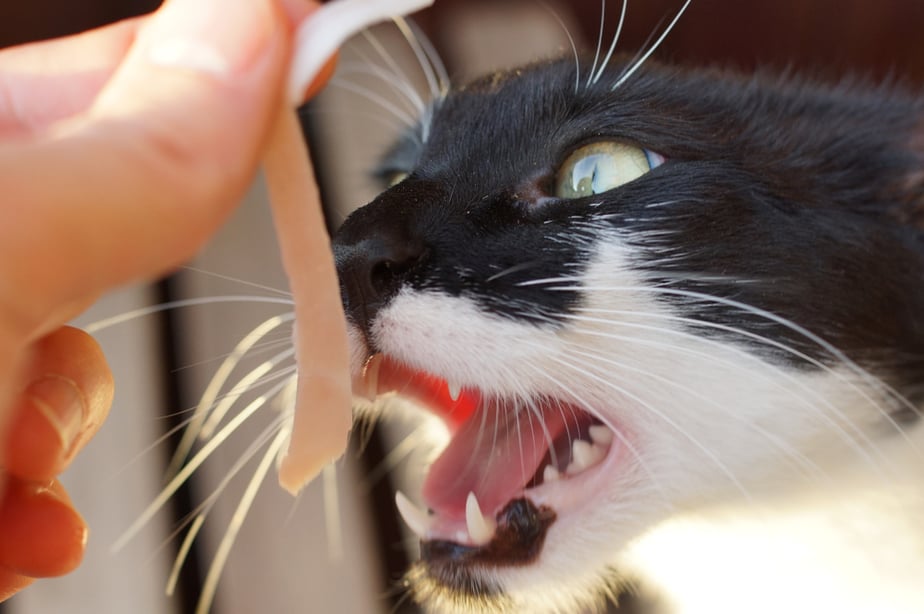
Oh, the age-old question “Can cats eat raw meat?” While there have been numerous discussions on this topic, you’re responsible for making the right choice for your furchild. Your cat’s digestive system might be equipped to process raw meats, but you should be aware of the risks.
Raw meats, including raw bacon, may contain parasites and bacteria like salmonella, E. coli, yersinia, and campylobacter. Consuming any type of raw meat puts your cat at risk of developing gastrointestinal distress and systemic illnesses.
While cooked bacon isn’t considered healthy for feline consumption, it’s certainly the lesser evil for your feline friend than raw bacon. No need to panic if you catch your cat munching on a small piece of raw bacon, but you definitely shouldn’t make it an everyday occurrence.
Can cats eat turkey bacon?
If you’re looking for a healthier alternative for your furkid, you might want to look into turkey bacon. Turkey bacon is made out of turkey meat that has been seasoned and shaped to look like your regular pork bacon. So, what makes it a better choice for your cat?
Well, turkey bacon is generally considered safe for feline consumption. It has a much lower fat content which makes it less dangerous for your cat’s health (and her weight). It’s also the most popular commercially available bacon substitute. But…
Turkey bacon is still highly processed and incredibly high in sodium. While it might be a slightly better choice than pork bacon, you shouldn’t include it in your cat’s diet. Your cat already gets all the sodium she needs from her regular cat food.
What about bacon fat?
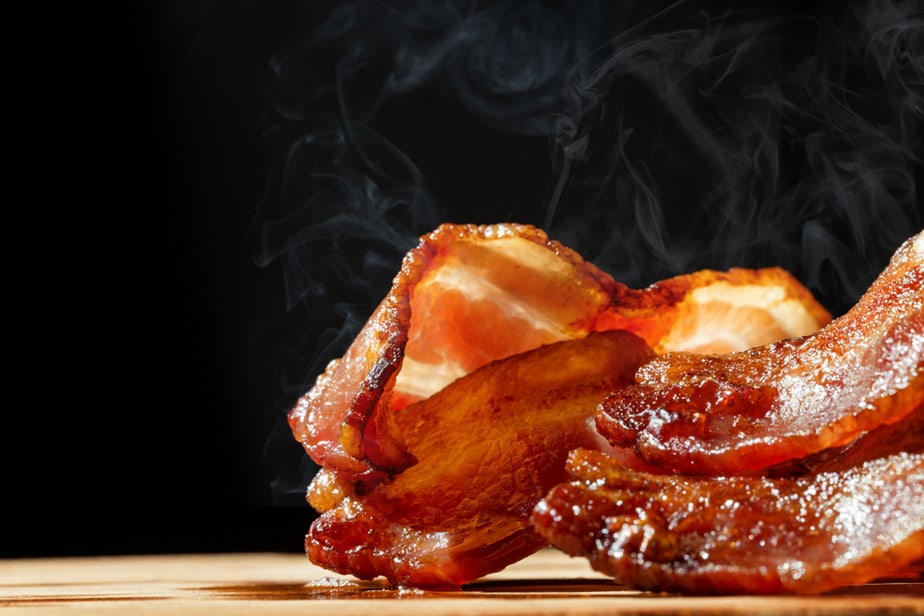
Bacon fat isn’t toxic to cats, but… As we know, there’s always a but when it comes to feeding your cat human foods.
Think about it, what makes bacon bad for your cat? If you answered “copious amounts of salt, fat, and preservatives,” you would be correct. Bacon fat is one of the biggest concerns of the entire bacon-for-cats narrative.
Unfortunately, bacon fat isn’t healthy for your cat. Consuming foods that are high in saturated fats might lead your feline friend to experience digestive issues such as soft stools, diarrhea, vomiting, and indigestion.
Additionally, consuming bacon fat over a longer period of time can result in serious diseases like diabetes and obesity. You might think your chonky looks adorable with all that extra fluff, but excessive weight gain may earn her cardiovascular problems.
Can cats eat bacon? Final verdict!
You’ve now got your answer to whether cats can eat bacon. According to the ASPCA, bacon isn’t toxic to cats. However, you shouldn’t include bacon in your cat’s regular diet because it contains plenty of dangerous ingredients.
Sodium nitrate, salt, fat – you don’t want any of these in your four-legged friend’s belly! Not only are they incredibly distressing to her digestive system, but they also might lead to serious health problems and diseases in the long run.
It’s safe to say that you should avoid feeding bacon to your cat. If she does make an attempt to steal a bite of your breakfast, don’t be too concerned. A bite or two shouldn’t cause her any long-lasting harm. Just make sure it doesn’t happen again. Your cat’s health is priority!
